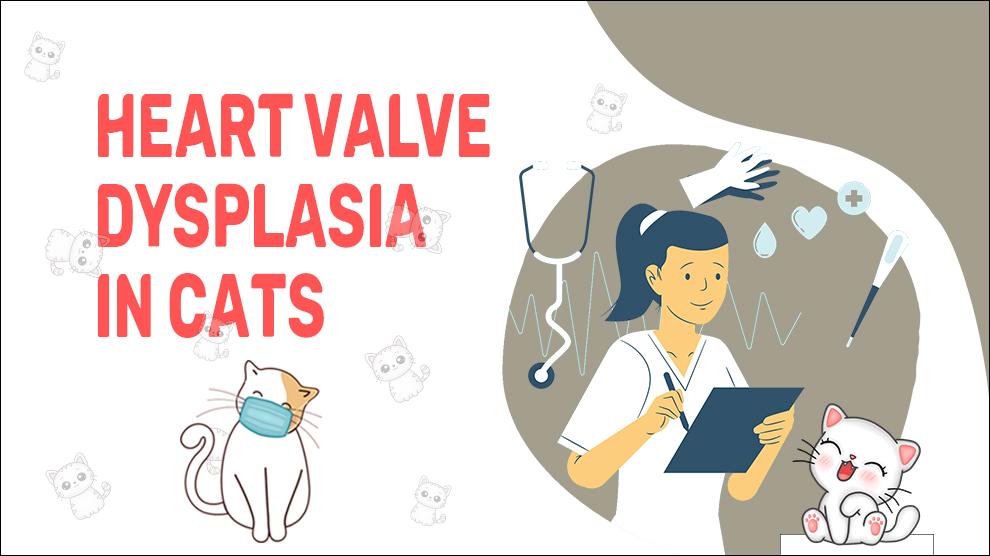What Is Heart Valve Dysplasia In Cats?
Heart valve dysplasia is a cardiac disorder in cats that affects the function of their heart valves. The condition can be congenital or acquired, and it can lead to serious complications if left untreated.
Clinical Signs Of Heart Valve Dysplasia In Cats
The symptoms of heart valve dysplasia in cats can vary depending on the severity of the condition.
Some of the most common symptoms include:
- Difficulty breathing or shortness of breath
- Lethargy or weakness
- Loss of appetite
- Coughing or wheezing
- Rapid heartbeat or arrhythmia
- Fainting or collapse
- Weight Loss
- Loss Of Muscle Mass
- Bluish Gums
- Pale Gums
- Weak Pulse Rate
- Fluid-Filled Abdomen
If your cat is exhibiting any of these symptoms, it is important to seek veterinary care immediately.
Treatment Options For Heart Valve Dysplasia In Cats
The treatment for heart valve dysplasia in cats will depend on the severity of the condition. In mild cases, medication may be sufficient to manage symptoms and slow the progression of the disease.
Common medications used to treat heart valve dysplasia in cats include:
- Diuretics – To reduce fluid buildup in the lungs and abdomen
- ACE inhibitors – To reduce blood pressure and improve heart function
- Beta-blockers – To slow the heart rate and reduce the workload on the heart
In more severe cases, surgery may be necessary to repair or replace damaged heart valves. This may involve open-heart surgery or less invasive procedures such as balloon valvuloplasty.
Home Remedies For Heart Valve Dysplasia In Cats
There are no known home remedies for heart valve dysplasia. Treatment should be left to a veterinarian.
How To Prevent Heart Valve Dysplasia In Cats?
Preventing heart valve dysplasia in cats can be difficult, as many cases are congenital or the result of underlying medical conditions.
However, there are a few things cat owners can do to reduce the risk of heart valve dysplasia, including:
- Regular veterinary check-ups – Regular check-ups with a veterinarian can help identify heart valve dysplasia early and prevent complications.
- Good nutrition – Providing your cat with a balanced diet can help support heart health.
- Exercise – Regular exercise can help keep your cat's heart healthy and reduce the risk of obesity, which can contribute to heart problems.
Affected Cat Breeds Of Heart Valve Dysplasia In Cats
Heart valve dysplasia can affect any breed of cat, but some breeds have a higher risk than others. These breeds include the Siamese, Persian, Maine Coon, and Devon Rex.
Causes For Heart Valve Dysplasia In Cats
Causes:
Heart valve dysplasia in cats can be caused by a variety of factors. In some cases, it may be a congenital condition, meaning it is present at birth. Other times, it can be acquired as a result of infections or other medical conditions.
Some of the most common causes of heart valve dysplasia in cats include:
- Genetic factors – Certain breeds of cats may be more prone to heart valve dysplasia, including Siamese, Persians, and Himalayans.
- Infections – Bacterial infections such as endocarditis can damage the heart valves and lead to dysplasia.
- Degenerative diseases – As cats age, their heart valves can become less elastic and more prone to dysplasia.
When To See A Vet For Heart Valve Dysplasia In Cats?
If you notice any symptoms of heart valve dysplasia in your cat, it is important to seek veterinary care immediately.
Your veterinarian will perform a physical exam, take a medical history, and may recommend diagnostic tests such as blood work, X-rays, or an echocardiogram to confirm a diagnosis.
Food Suggestions For Heart Valve Dysplasia In Cats
Feeding a high-quality, balanced diet can help keep your cat healthy and manage symptoms of heart valve dysplasia.
Your veterinarian may also recommend a special diet that is lower in sodium to help manage fluid retention.
Conclusion
Heart valve dysplasia is a serious heart condition that can lead to heart failure if left untreated. Early diagnosis and treatment can help manage symptoms and improve your cat's quality of life.
If you notice any symptoms of heart valve dysplasia, such as coughing or difficulty breathing, it's important to seek veterinary care as soon as possible.
Your veterinarian can perform diagnostic tests and recommend a treatment plan that is tailored to your cat's individual needs.
By working with your veterinarian and following their recommendations, you can help keep your cat healthy and happy for years to come.











